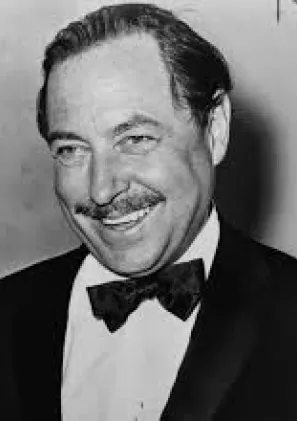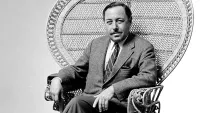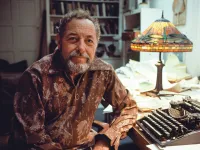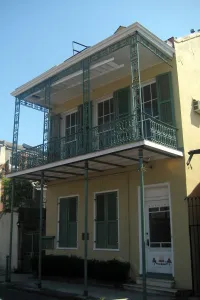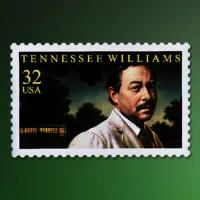Biography
1911 - 1983
"The only thing worse than a liar is a liar that's also a hypocrite!"
- Tennessee Williams
Although he began writing as a youth he came into his own as a playwright only after moving to New Orleans in the 1940s. It was around that same time that he began to explore his first relationship with another man, a dancer named Kip, who died of a brain tumor with Williams at his bedside in 1944. The trauma of that early loss set the stage for mental health issues to play a role in almost everything he wrote. Three years later, he met and fell in love with Frank Merlo, his most significant relationship, which lasted until Merlo’s death from lung cancer in 1963. Williams was heavily influenced by the trials and tragedies that touched his life and often incorporated these elements – including his sister’s schizophrenia and frontal lobotomy – into his writing. This inspired such memorable works as The Glass Menagerie (1944), A Streetcar Named Desire (1947), Summer and Smoke (1948), The Rose Tattoo (1951), Cat on a Hot Tin Roof (1955), Suddenly, Last Summer (1958) and Sweet Bird of Youth (1959). Among his numerous awards are two Pulitzer Prizes (1948 and 1955), the Kennedy Center Honors (1979) and the Presidential Medal of Freedom (1980). In spite of his successes and critical acclaim, he was not without his detractors, such as Louis Kronenberger – who excoriated his work as a “fetid swamp” – when he outed Williams in TIME Magazine in the 1950s. And some gay critics have often taken issue with him, as well, by finding his characterizations of gay men depressing. Williams defended his negative depictions as honest accounts of gay life as he had experienced it because the gay people of his era “were living for a future that would happen after they were dead.”
1911 - 1983
"The only thing worse than a liar is a liar that's also a hypocrite!"
- Tennessee Williams
Although he began writing as a youth he came into his own as a playwright only after moving to New Orleans in the 1940s. It was around that same time that he began to explore his first relationship with another man, a dancer named Kip, who died of a brain tumor with Williams at his bedside in 1944. The trauma of that early loss set the stage for mental health issues to play a role in almost everything he wrote. Three years later, he met and fell in love with Frank Merlo, his most significant relationship, which lasted until Merlo’s death from lung cancer in 1963. Williams was heavily influenced by the trials and tragedies that touched his life and often incorporated these elements – including his sister’s schizophrenia and frontal lobotomy – into his writing. This inspired such memorable works as The Glass Menagerie (1944), A Streetcar Named Desire (1947), Summer and Smoke (1948), The Rose Tattoo (1951), Cat on a Hot Tin Roof (1955), Suddenly, Last Summer (1958) and Sweet Bird of Youth (1959). Among his numerous awards are two Pulitzer Prizes (1948 and 1955), the Kennedy Center Honors (1979) and the Presidential Medal of Freedom (1980). In spite of his successes and critical acclaim, he was not without his detractors, such as Louis Kronenberger – who excoriated his work as a “fetid swamp” – when he outed Williams in TIME Magazine in the 1950s. And some gay critics have often taken issue with him, as well, by finding his characterizations of gay men depressing. Williams defended his negative depictions as honest accounts of gay life as he had experienced it because the gay people of his era “were living for a future that would happen after they were dead.”
Demography
Demography
Gender Male
Sexual Orientation Gay
Gender Identity Cisgender
Ethnicity Caucasian/White
Faith Construct Catholic Protestant
Nations Affiliated United States
Era/Epoch Cold War (1945-1991) Information Age (1970-present)
Field(s) of Contribution
Author
Poet
Commemorations & Honors
Group Theatre Prize (1939)
Rockefeller Grant (1939)
Sidney Howard Memorial Award, The Glass Menagerie (1945)
Donaldson Award and New York Drama Critics' Circle Award, The Glass Menagerie (1945)
New York Drama Critics' Circle Award, Donaldson Award and Pulitzer Prize, A Streetcar Named Desire (1948)
Tony Award, The Rose Tattoo (1952)
Pulitzer Prize and Tony Award, Cat on a Hot Tin Roof (1955)
New York Drama Critics' Circle Award and Tony Award, The Night of the Iguana (1961)
American Academy of Arts and Letters Gold Medal for Drama (1969)
Saint Louis University Library Associates St. Louis Literary Award (1974)
American Theater Hall of Fame Inductee (1979)
Kennedy Center Honoree (1979)
Presidential Medal of Freedom For Literature (1980)
Posthumous St. Louis Walk of Fame Star (1989)
U.S. Postal Service Literary Arts Series Commemorative Stamp (1994)
Posthumous Cathedral of Saint John the Divine in New York Poets' Corner Inductee (2009)
Inaugural San Francisco Rainbow Honor Walk Honoree (2014)
Demography
Gender Male
Sexual Orientation Gay
Gender Identity Cisgender
Ethnicity Caucasian/White
Faith Construct Catholic Protestant
Nations Affiliated United States
Era/Epoch Cold War (1945-1991) Information Age (1970-present)
Field(s) of Contribution
Author
Poet
Commemorations & Honors
Group Theatre Prize (1939)
Rockefeller Grant (1939)
Sidney Howard Memorial Award, The Glass Menagerie (1945)
Donaldson Award and New York Drama Critics' Circle Award, The Glass Menagerie (1945)
New York Drama Critics' Circle Award, Donaldson Award and Pulitzer Prize, A Streetcar Named Desire (1948)
Tony Award, The Rose Tattoo (1952)
Pulitzer Prize and Tony Award, Cat on a Hot Tin Roof (1955)
New York Drama Critics' Circle Award and Tony Award, The Night of the Iguana (1961)
American Academy of Arts and Letters Gold Medal for Drama (1969)
Saint Louis University Library Associates St. Louis Literary Award (1974)
American Theater Hall of Fame Inductee (1979)
Kennedy Center Honoree (1979)
Presidential Medal of Freedom For Literature (1980)
Posthumous St. Louis Walk of Fame Star (1989)
U.S. Postal Service Literary Arts Series Commemorative Stamp (1994)
Posthumous Cathedral of Saint John the Divine in New York Poets' Corner Inductee (2009)
Inaugural San Francisco Rainbow Honor Walk Honoree (2014)
Resources
Resources
Bergman, David. Gaiety Transfigured: Gay Self-Representation in American Literature. Madison: University of Wisconsin Press, 1991.
Bigsby, C. W. E. A Critical Introduction to Twentieth Century American Drama, II: Williams, Miller, Albee. Cambridge: Cambridge University Press, 1994.
Butters, Ronald, Clum, John M., Moon, Michael, eds. "Something Cloudy, Something Clear: Homophobia in Tennessee Williams." Displacing Homophobia: Studies in Gay Male Literature and Culture. Durham, N.C.: Duke University Press, 1989. 149-167.
Clum, John M. Acting Gay: Male Homosexuality in Modern Drama. New York: Columbia, 1992.
Leverich, Lyle. Tom: The Unknown Tennessee Williams. New York: Crown, 1995.
Roundané, Matthew, ed. The Cambridge Companion to Tennessee Williams. New York: Cambridge University Press, 1997.
Savran, David. Communists, Cowboys and Queers: The Politics of Masculinity in the Work of Arthur Miller and Tennessee Williams. Minneapolis: University of Minnesota Press, 1992.
St. Just, Maria. Five O'Clock Angel: Letters of Tennessee Williams to Maria St. Just, 1948-1982. New York: Knopf, 1990.
Summers, Claude J. Gay Fictions: Wilde to Stonewall: Studies in a Male Homosexual Literary Tradition. New York: Continuum, 1990.
https://en.wikipedia.org/wiki/Tennessee_Williams
https://www.nytimes.com/books/00/12/31/specials/williams-art.html
http://www.pbs.org/wnet/americanmasters/episodes/tennessee-williams/about-tennessee-williams/737/
https://www.spectrumsouth.com/tennessee-williams-retrospect/
Resources
Bergman, David. Gaiety Transfigured: Gay Self-Representation in American Literature. Madison: University of Wisconsin Press, 1991.
Bigsby, C. W. E. A Critical Introduction to Twentieth Century American Drama, II: Williams, Miller, Albee. Cambridge: Cambridge University Press, 1994.
Butters, Ronald, Clum, John M., Moon, Michael, eds. "Something Cloudy, Something Clear: Homophobia in Tennessee Williams." Displacing Homophobia: Studies in Gay Male Literature and Culture. Durham, N.C.: Duke University Press, 1989. 149-167.
Clum, John M. Acting Gay: Male Homosexuality in Modern Drama. New York: Columbia, 1992.
Leverich, Lyle. Tom: The Unknown Tennessee Williams. New York: Crown, 1995.
Roundané, Matthew, ed. The Cambridge Companion to Tennessee Williams. New York: Cambridge University Press, 1997.
Savran, David. Communists, Cowboys and Queers: The Politics of Masculinity in the Work of Arthur Miller and Tennessee Williams. Minneapolis: University of Minnesota Press, 1992.
St. Just, Maria. Five O'Clock Angel: Letters of Tennessee Williams to Maria St. Just, 1948-1982. New York: Knopf, 1990.
Summers, Claude J. Gay Fictions: Wilde to Stonewall: Studies in a Male Homosexual Literary Tradition. New York: Continuum, 1990.
https://en.wikipedia.org/wiki/Tennessee_Williams
https://www.nytimes.com/books/00/12/31/specials/williams-art.html
http://www.pbs.org/wnet/americanmasters/episodes/tennessee-williams/about-tennessee-williams/737/
https://www.spectrumsouth.com/tennessee-williams-retrospect/
